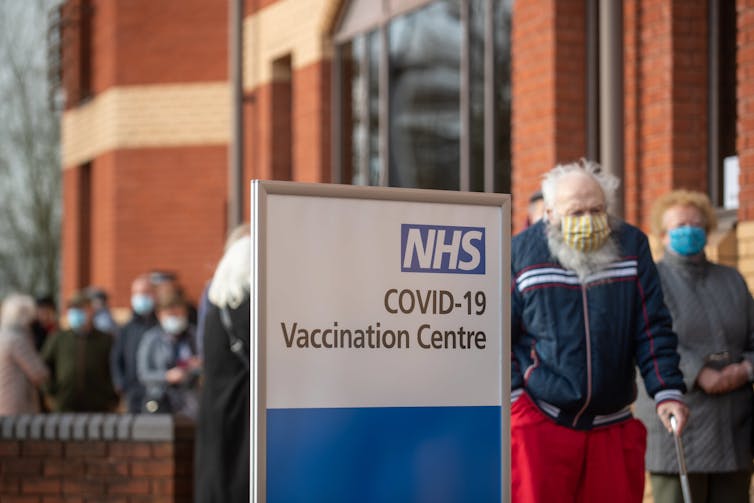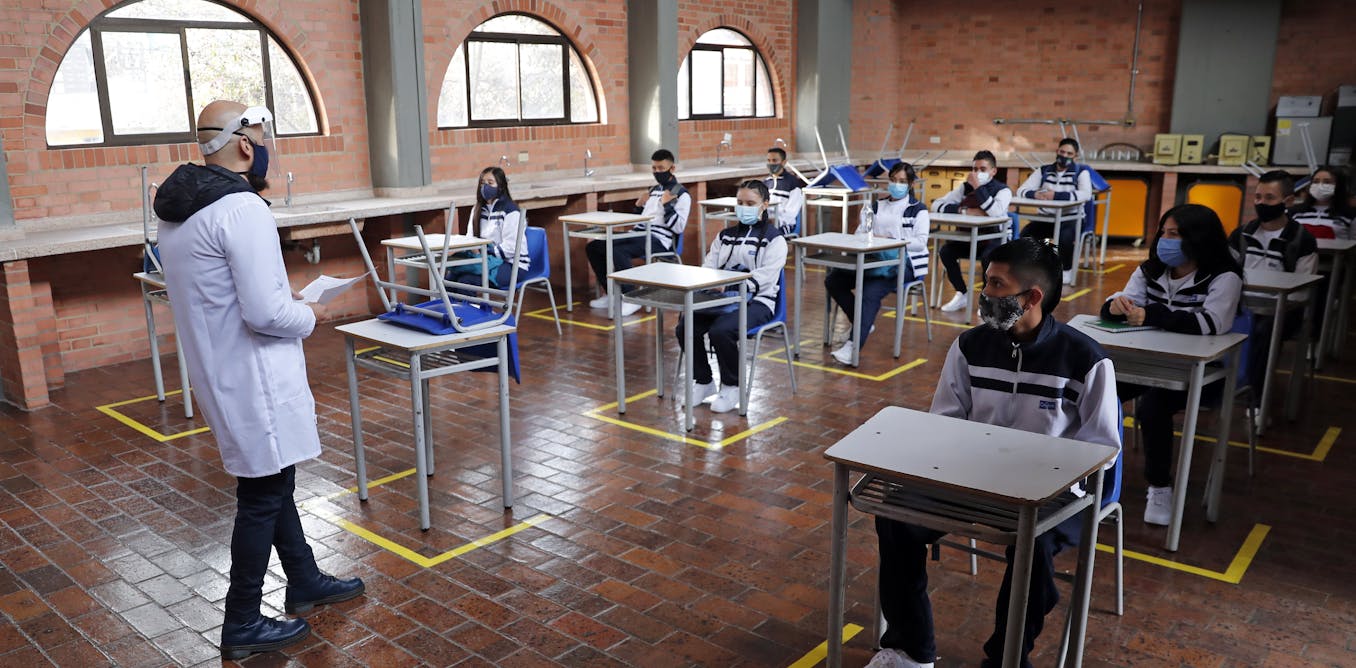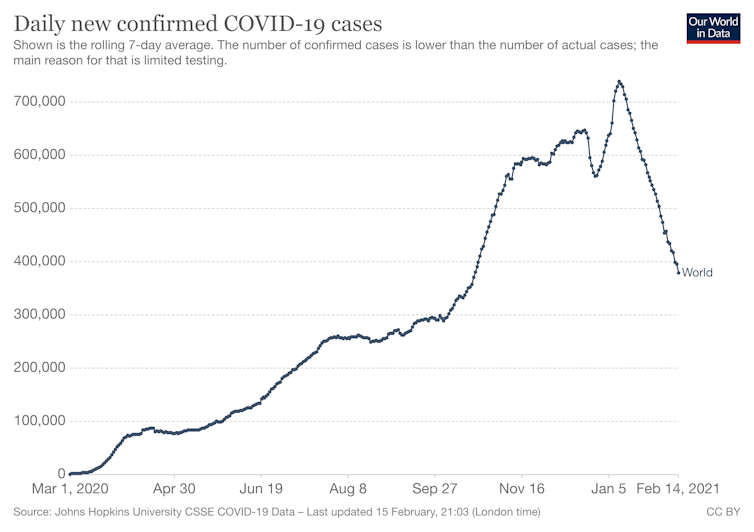COVID Receding ... COVID advancing
"There are many countries thankfully where that [downward trajectory] is happening. And there are many countries in which that downward trend is not being achieved.""What we do know in countries that are applying persistent and consistent measures in terms of public health and social measures and individual behaviour that that is affecting the trajectory of all variants.""[While they -- variants -- have a propensity for higher levels of transmission], what is clear is that the control measures ... are effective in driving that down.""It's a lesson for all of us [in view of infections rising in some countries] that this is not over. It's not over for anybody. And any relaxation of our resolve is dangerous.""We need to be very aware. This virus still has a lot of energy and if the measures we apply are not persistent, comprehensive and aimed at continuing to suppress transmission while introducing vaccines, we will pay a price."Dr.Mike Ryan, director general, emergency program, World Health Organization
 |
Globally there is good news about COVID-19; the number of confirmed infections with the SARS-CoV-2 virus is dropping. Case numbers have been reduced from over five million a week in January to the current 2.5 million in mid-February. Unfortunately this is neither universal nor uniform in countries all over the world. Some have had better 'luck' in their efforts to control the omnivorous virus than have others. Brazil, for one example of a country hit hard in the first wave of infections, and continuing to see runaway numbers, surpassed a quarter-million COVID-related deaths this week, ranking as the second-highest death toll in the world, behind that of the United States.
Five states in India with its vast population centres, see surging cases of the novel coronavirus. Mosques and schools in Iraq are closed and nighttime and weekend curfews have been imposed. In Mexico, hospitals are desperate for oxygen supplies, and it isn't the only low- and middle-income country to find itself in that position of desperation. In the country with, to date the worst record of deaths resulting from the virus, a steep fall in cases has occurred in the United States, where 73,400 new cases have been diagnosed in comparison to early January when 250,000 cases per day were registered, leading to suggestions the epidemic may be levelling off.
 |
| Village and community
health volunteers are the eyes and ears of Thailand's disease control
system, contributing greatly to the country's effective COVID-19
response. WHO |
The new concerns in health circles around the world rest with "variants of concern", highly contagious viruses (VOCs) taking root everywhere. The number of global cases fell for the sixth consecutive week last week, representing an 11 percent decline, in comparison to the previous week, according to a World Health Organization situation update released on February 23. New deaths reported at 66,000 also fell, by 20 percent week-over-week.
Globally, Friday's figures read 111 million confirmed cases with 2.5 million deaths around the world. The United States, Brazil, France, Russia and India are the countries reporting the highest number of new cases yet some of the steepest declines puzzlingly have been in some of those countries the hardest hit last year; among them the United States, United Kingdom, South Africa, Israel and Portugal. COVID alert level in Britain declined a notch, reflecting that hospitals no longer see themselves at risk of being overwhelmed.
A three-week lockdown beginning March 8 to stem a surge in cases has been ordered in Finland, which boasts the third-lowest infection rate in Europe, after Iceland and Norway, with 590 reported this week, representing the highest number since the pandemic's start. According to experts, "patience, prudence" and vaccines are beaming a ray of hope for a reprieve from COVID.
According to Harvard University epidemiologist Michael Mina, vaccines are playing a part in raising hopes as confirmed case numbers are slowly dropping, along with deaths from t he virus, butit is tighter restrictions that can for the most part be attributed to the hopeful signs that COVID may yet be beaten in shorter order than prophesied by a worn medical community. Across England, as an example, infections have dropped by two-thirds since the lockdown that was initiated in January.
“No one likes lockdowns, they’re terrible and devastating, but they work. If you have a lot of cases in an area with a lot of people and you lock it down you are going to see cases go down and we see this time and time again.”"[Other measures, such as people wearing masks indoors, are] extremely helpful [in bringing new cases down but we] can’t discount the seasonality [of COVID-19 being a factor in fewer virus transmissions].We still don’t know enough about it, but that may be a factor.""We don’t have a cure. We have treatments which are fine but no cure. We know that younger people who are included in clinical trials are unlikely to die because they’re young, but people are still getting pretty sick – and in addition we know there are long-term symptoms from this virus.”“We have to respect the variants of concern, we don’t know enough about them, we know that some are more transmissible – we saw one COVID-19 mutation get married to another COVID-19 mutation – we still don’t know how that will work, that’s the recombinant virus.""While we have to be open-minded to new data, as things are reopening we need to approach with caution so we don’t get a third wave."Toronto infectious disease specialist Dr. Isaac Bogoch
 |
| EPA/Mauricio Duenas Castaneda |
"One, we came off of really high numbers from the holidays.""Second, there is pretty good evidence that people are doing a better job of social distancing and mask wearing.""Third, I think in a lot of communities, we've had so much infection that you have some level of population immunity. Not herd immunity, but enough population immunity that it is causing the virus to slow down."Dr. Ashish Jha, dean, Brown University School of Public Health.

Labels: COVID Variants, Decreasing Cases. Global Hotspots, Global Pandemic, Vaccines, WHO

0 Comments:
Post a Comment
<< Home